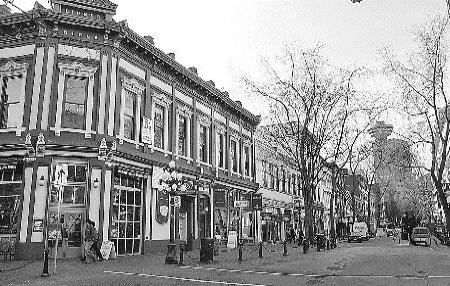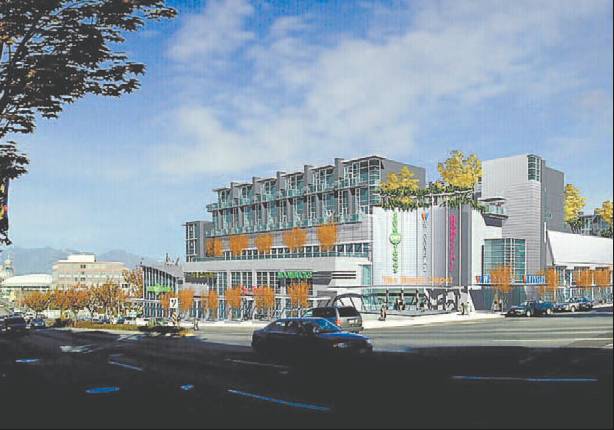Jon Stovell
Sun

The 100 block of Water Street. There are plans for the area that don’t involve a third downtown stadium. Photograph by : Ian Smith, Vancouver Sun Files
Vancouver city council is scheduled next week to make a decision that could change for the better or worse the future of Gastown, one of Canada’s premier heritage districts and an area that has, until recently, been treated as an afterthought by city staff and various city councils.
At stake is a decision on whether the city should fast-track the Vancouver Whitecaps’ proposal for a controversial downtown stadium to be built on a podium over the CP Rail tracks.
However, the true impact of this decision will be borne by the many businesses and residents of this nearby community who are sure that the stadium and the inevitable other podium developments planned by the Whitecaps will undermine the significant revitalization already underway in their neighbourhood.
At issue for many of these businesses and residents is the necessity of a third stadium in the downtown peninsula. With both B.C. Place and General Motors Place only four to five blocks away, Gastown is already well versed in dealing with the impacts of nearby stadiums.
Why should the city sacrifice the last remaining piece of prime waterfront land to build yet another stadium?
If B.C. Place is suitable for the B.C. Lions, why is it not good enough for the Vancouver Whitecaps? If B.C. Place is going to be torn down in a few years, why don’t the Whitecaps and the Lions get together and build a new outdoor stadium on existing B.C. Place land? Why isn’t the city helping them out?
The second issue for many is why this stadium must be built over the railway tracks.
The Whitecaps and CP Rail both talk about how the tracks will never move, but is that true? The tracks don’t really go anywhere and are simply used as a parking lot for shunting or shifting cars around. If that’s the case, why don’t they simply move this activity to somewhere closer to the port?
Why does this activity need to take place on such valuable land? Land whose value would increase by 20 times over if the tracks were moved or relocated?
Conversely, if the tracks are necessary and critical, why should we suddenly be compelled to build over them in a way that may reduce their flexibility or expansion and permanently cut Gastown off from the future of the waterfront?
If the tracks are moved, what kind of possibilities would that create for this land and for Vancouver?
The Gastown Business Improvement Society has developed plans for new mixed-use development that would include a greenway adjacent to the heritage buildings, both highrise and low-rise residential developments, new affordable housing, new Triple A office buildings as well as some new cultural amenities or theatres.
In other words, in place of one stadium the city would unlock a wealth of value and interesting possibilities that would be more conducive and sensitive to the nearby heritage community and benefit all the citizens of the city, east and west.
Of course, before you can say Yes or No to either a stadium or other potential ideas, the city needs a comprehensive plan to analyse what would be the best use of this land. This is a reasonable idea and one that city staff has recommended to council.
They have indicated that the many issues identified in the initial review of the stadium would be best solved as part of a broader review of the entire area in consultation with other stakeholders and landowners. The Vancouver Port Corp., the largest landholder in the area, has agreed.
This not only presents the Whitecaps with an opportunity to resolve some of the issues with their stadium, but to also elaborate on their plans for the remainder of the railyard lands to Main Street.
This type of planning is not something new and is consistent with the way that any project this size would be treated. It also follows on the advice that the Vancouver Whitecaps got before they bought the rail land — that it was “somewhat of a long shot,” in the words of city planner Larry Beasley. The Whitecaps organization was told that this would be a long process due to all the difficulties with the site and yet it still went ahead.
When council comes to its decision, it will surely weigh these and other factors in determining the appropriate course of action.
In a recent poll commissioned by the Gastown Neighbourhood Coalition, more than 70 per cent of Vancouver residents surveyed were in favour of the city initiating a planning process to determine the best use for this site and in looking at other possible locations in the city.
It is to be hoped that city council will stop and listen to its staff, and to these and other voices and make sure the proposal for a stadium goes through a comprehensive plan before being considered further.
Jon Stovell is with the Gastown Neighbourhood Coalition.
© The Vancouver Sun 2006



